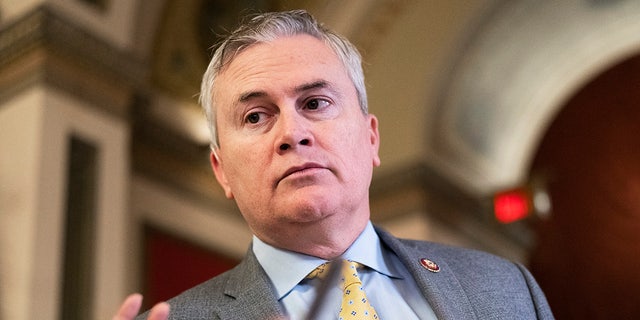
FIRST ON FOX: Republicans on the House Oversight and Accountability Committee are probing the Environmental Protection Agency (EPA) over its proposal to crack down on fossil fuel power plant emissions.
The 22 GOP lawmakers — led by Rep. Jake LaTurner, R-Kan., and James Comer, R-Ky., the panel’s chairman — sent a letter to EPA Administrator Michael Regan on Wednesday, expressing concern that the agency failed to properly consider the cost impacts and technological feasibility of the rule announced last month. The Republicans asked Regan to extend the public feedback period and requested various internal communications about the rulemaking process.
“It is difficult to overstate the threat that the proposed performance standards pose to grid reliability in the United States,” they wrote in the letter. “If the proposed rule went into effect, it would have the strongest impact on power plants supplying baseload power to the electric grid.”
“Over the past two years, millions of Americans have felt the crushing weight of rising utility bills as a direct result of this Administration’s assault on domestic energy production,” the letter continued. “At a time of nationwide calls for increased electrification, the EPA’s knowingly decreasing generating capacity is a textbook bait-and-switch to American consumers.”
REPUBLICANS TAKE ACTION TO OVERTURN BIDEN’S POWER PLANT CRACKDOWN

The 22 GOP lawmakers — led by Rep. Jake LaTurner, R-Kan., and James Comer, R-Ky., the panel’s chairman — sent a letter to EPA Administrator Michael Regan on Wednesday, expressing concern that the agency failed to properly consider the cost impacts and technological feasibility of the rule announced last month. The Republicans asked Regan to extend the public feedback period and requested various internal communications about the rulemaking process. (CQ-Roll Call/Getty Images)
Overall, EPA’s plan — which the agency said would curb nationwide power sector emissions by about 617 million metric tons through 2042 — forces electric power providers to slash pollution by about 90% over the next two decades. To achieve such aggressive emissions reductions, power plants must adopt carbon capture, a nascent and costly technology, or shut down.
If it is finalized and implemented, U.S. electric generation derived by coal plants without carbon capture will decline 67% by 2030 and 100% by 2035, while coal plants with carbon capture will increase 29% and 13%, respectively, the analysis also showed.
JOE MANCHIN THREATENS TO OPPOSE BIDEN NOMINEES OVER UPCOMING POWER PLANT CRACKDOWN
However, the Republicans wrote Wednesday that carbon capture technology remains “largely untested at scale” and where it is currently used, the technology achieves lower rates of capture than those required under the proposal. And they added carbon capture will be cost-prohibitive to many power plants.

The Republicans wrote Wednesday that carbon capture technology remains “largely untested at scale” and where it is currently used, the technology achieves lower rates of capture than those required under the proposal. And they added carbon capture will be cost-prohibitive to many power plants. (Tom Williams/CQ-Roll Call, Inc via Getty Images)
“This Administration must focus more on keeping the lights on for American citizens, and less on antagonizing reliable sources of power generation,” LaTurner, Comer and the other Oversight Committee lawmakers added. “To sacrifice affordable energy, national security, and global competitiveness would be unacceptable tradeoffs for the marginal emissions reductions EPA is projecting.”
The Republicans also requested that the EPA extend its public feedback period and seriously consider power industry concerns.
They also asked for EPA documents and communications related to the proposal to assist with their assessment of the regulations.

Overall, EPA’s plan — which the agency said would curb nationwide power sector emissions by about 617 million metric tons through 2042 — forces electric power providers to slash pollution by about 90% over the next two decades. To achieve such aggressive emissions reductions, power plants must adopt carbon capture, a nascent and costly technology, or shut down. (Drew Angerer/Getty Images)
“President Biden’s failed energy policies have resulted in the highest electricity prices in four decades and skyrocketing utility bills,” LaTurner told Fox News Digital. “The EPA’s new power plant emissions restrictions are just another example of this President and his army of unelected bureaucrats forcing burdensome and costly regulations on domestic energy producers.”
“The Biden Administration should focus more on keeping the lights on for American families and less on their reckless Green New Deal agenda,” he continued. “I’m proud to work with Chairman Comer and my colleagues on the Oversight Committee to demand answers and accountability for the American people.”
CLICK HERE TO GET THE FOX NEWS APP
As part of President Biden’s climate agenda — he announced in 2021 his intention to create a 100% carbon pollution-free power sector by 2035 — his administration has pushed policies boosting renewable power sources like wind and solar farms. While such green energy has grown dramatically, buoyed by favorable federal and state incentives, they still produce just 14% of U.S. electricity and are intermittent, or dependent on weather conditions.
Solar panels, for example, produce just 25% and wind turbines produce 34% of their listed capacity, according to the Energy Information Administration. Coal, natural gas and nuclear power plants, meanwhile, produce 49%, 54% and 93% of their listed capacity, respectively.
Additionally, during a recent Senate hearing, all four members of the Federal Energy Regulatory Commission expressed concern about the early retirement of coal-fired power generation. Commissioner James Danly said he feared the impacts of forced retirements “are going to be catastrophic.”
In December, the top U.S. grid watchdog said the nation was at risk of more capacity shortfalls because of fossil fuel retirements.








